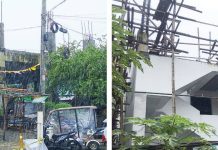BY THE ALLIANCE OF CONCERNED TEACHERS
THE GOVERNMENT’s theme for this year’s
recent Teachers’ Month celebration, “Gurong
Pilipino: Handa sa Makabagong Pagbabago”, reeked of irony as the government
continue to fail in causing a meaningful change to public school teachers’ dire
economic situation.
Filipino teachers have hoped that the government would have no more plausible
reason to deny the fulfillment of its promised substantial salary increase.
However, from the grand electoral promise, President Duterte has procrastinated
for three years, and went short of reneging on his promise by downsizing his
pledge in his last State of the Nation Address.
The Duterte allies-dominated Lower House have played perfectly well with the
executive branch’s effort to shortchange teachers. It passed the 2020 DBM
proposed budget in no time and without revisions, refusing to listen to
teachers’ criticism of the P31 billion pay hike allocation that would only add
a scant P49 to the daily family budget of public sector workers if divided
equally.
The Lower House had also approved the
sizable cuts in education budget that would prolong the sufferings of teachers
and students in the ever-declining state of the educational system. These,
amidst the unacceptable preference in funding wars, questionable infrastructure
projects, and pork barrel.
The Department of Education only has tokenistic perks to match its rhetorical
praises for teachers. It harps on petty discounts and freebies purportedly to
show appreciation to teachers’ invaluable contribution to
‘nurturing families, strengthening communities, and building the nation. It
hypes the grant of the measly P1,000 World Teachers Day Incentive Bonus to
pride itself of the agency’s supposed efforts for teachers.
DepEd ironically talks about the “indispensability of teachers in keeping the
humanistic aspects of education” while the government deny teachers of their
basic human rights to decent salaries and humane working conditions.
Apart from low salary, teachers suffer
from policies and practices that render them overworked. Large class size
requires extra effort in teaching duties. Lack of education support personnel
and school-based programs of other agencies burden them with non-teaching
tasks. The K-12 program and the RPMS-PPST evaluation system require them to
accomplish loads of paperwork. They are compelled to fill in the shortages in
facilities and maintenance budget. The dismal state of Philippine education
have essentially altered the role of teachers from being mentors to being
bearers of all its problems.
Tuparin ang pangako!/PN





